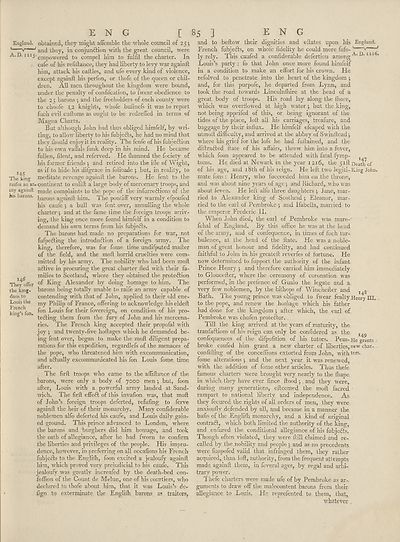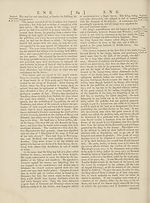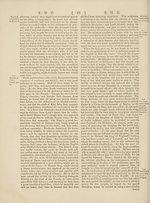Encyclopaedia Britannica, or, a Dictionary of arts, sciences, and miscellaneous literature : enlarged and improved. Illustrated with nearly six hundred engravings > Volume 8, ELE-FOR
(97) Page 85
Download files
Complete book:
Individual page:
Thumbnail gallery: Grid view | List view

ENG [ 8s ] ENG
MS
The king
raifes an ar.
my againft
Jus barons.
145
liey offer
>e kmg-
anv to
ouis the
rcnch
ing’s fon.
obtained, they might affemble the whole council of 25 5
and they, in conjunftion with the great council, were
'empowered to compel him to fulfil the charter. In
cafe of his refiftance, they had liberty to levy war againft
him, attack his caftles, and ufe every kind of violence,
except againft his perfon, or thofe of the queen or chil¬
dren. All men throughout the kingdom were bound,
under the penalty of confifcation, to fwear obedience to
the 2 5 barons j and the freeholders of each county were
to choofe 1j2 knights, whofe bufinefs it was to report
fuch evil cuftoms as ought to be redreffed in terms of
Magna Charta.
But although John had thus obliged himfelf, by wri¬
ting, to allow liberty to his fubjefds, he had no mind that
they fhould enjoy it in reality. The fenfe of his fubjedlion
to his own vaiTals funk deep in his mind. lie became
fallen, filent, and referved. He ftiunned the fociety of
Ids former friends •, and retired into the ifle of Wight,
as if to hide his difgrace in folitude ; but, in reality, to
meditate revenge againft the barons. He fent to the
■ continent to enlift a large body of mercenary troops, and
made complaints to the pope of the infurredtions of the
barons againft him. The pontiff very warmly efpoufed
his caufe ; a bull was fent over, annulling the whole
charter 5 and at the fame time the foreign troops arriv¬
ing, the king once more found himfelf in a condition to
demand his own terms from his fubjedls.
The barons had made no preparations for war, not
fufpefting the introdudlion of a foreign army. The
king, therefore, was for fome tirhe undifputed mailer
of the field, and the moft horrid cruelties were com¬
mitted by his army. The nobility -who had been moft
active in procuring the great charter fled with their fa¬
milies to Scotland, where they obtained the protedlion
of King Alexander by doing homage to him. The
barons being totally unable to raife an army capable of
contending with that of John, applied to their old ene¬
my Philip of France, offering to acknowledge his eldeft
fon Louis for their fovereign, on condition of his pro-
tecling them from the fury of John and his mercena¬
ries. The French king accepted their propofal with
joy ; and twenty-five hoftages which he demanded be¬
ing fent over, began to make the moft diligent prepa¬
rations for this expedition, regardlefs of the menaces of
the pope, who threatened him with excommunication,
and a finally excommunicated his fon Louis fome time
after.
The firft troops who came to the afliftance of the
barons, were only a body of 7000 men •, but, foon
after, Louis with a powerful army landed at Sand¬
wich. The firft effeft of this invafion was, that moft
of John’s foreign troops deferted, refufing to ferve
againft the heir of their monarchy. Many confiderable
noblemen alfo deferted his caufe, and Louis daily gain¬
ed ground. This prince advanced to London, where
the barons and burghers did him homage, and took
the oath of allegiance, after he had fworn to confirm
the liberties and privileges of the people. His impru¬
dence, however, in preferring on all occafions his Frencli
fubjefls to the Engliih, foon excited a jealoufy againft
him, which proved very preiudicial to his caufe. This
jealoufy was greatly increafed by the death-bed con-
feflion of the Count de Melun, one of his courtiers, who
declared to thofe about him, that it was Louis’s de-
ftgn to exterminate the Englifli barons as traitors,
and to beftow their dignities and eftates upon his England.
French fubjecls, on whofe fidelity he could more fafe- u v
ly rely. This caufed a confiderable defertion among'''" *2*0,
Louis’s party : fo that John once more found himfelf
in a condition to make an effort for his crown. He
refolved to penetrate into the heart of the kingdom ;
and, for this purpofe, he departed from Lynn, and
took the road towards Lincolnfhire at the head of a
great body of troops. His road lay along the fliore,
■which was overflowed at high water j but the king,
not being apprifed of this, or being ignorant of the
tides of the place, loft all his carriages, treafure, and
baggage by their influx. He himfelf efcaped with the
utmoft difficulty, and arrived at the abbey of Swinfteadj
where his grief for the lofs he had fuftained, and the
diftradled ilate of his affairs, threw him into a fever,
which foon appeared to be attended with fatal fymp- „
toms. He died at Newark in the year 1216, the 51ft Death of
of his age, and 18th of his reign. He left two legiti-King John,
mate funs : Henry, wdro fucceeded him on the throne,
and was about nine years of age 5 and Richard, w ho was
about feven. He left alfo three daughters 5 Jane, mar¬
ried to Alexander king of Scotland ; Eleanor, mar¬
ried to the earl of Pembroke j and Ifabella, married to
the emperor Frederic II.
When John died, the earl of Pembroke was mare-'
fchal of England. By this office he was at the head
of the army, and of confequence, in times of fuch tur¬
bulence, at the head of the ftate. He was a noble¬
man of great honour and fidelity, and had continued
faithful to John in his greateft reverfes of fortune. He
now determined to fupport the authority of the infant
Prince Henry ; and therefore carried him immediately
to Gloucefter, where the ceremony of coronation was
performed, in the prefence of Gualo the legate and a
very few noblemen, by the biftiops of Winchefter and x g
Bath. The young prince was obliged to fwear fealty Henry III.
to the pope, and renew the homage which his father
had done for the kingdom ; after which, the earl of
Pembroke was chofen protedlor.
Till the king arrived at the years of maturity, the
tranfadlions of his reign can only be confidered as the
confequences of the difpofition of his tutors. Pern- He grants
broke caufed him grant a new charter of liberties, new char-
confifting of the concefiions extorted from John, withters'
fome alterations 5 and the next year it was renewed,
with the addition of fome other articles. Thus thefe
famous charters were brought very nearly to the fliape
in which they have ever fince flood ; and they were,,
during many generations, efteemed the moft facred
rampart to national liberty and independence. As
they fecured the rights of. all orders of men, they were
anxioufly defended by all, and became in a manner the
bafis of the Englifli monarchy, and a kind of original
contract, which both limited the authority of the king,
and enfured the conditional allegiance of his fubjedls.
Though often violated, they were full claimed and re¬
called by the nobility and people 5 and as no precedents,
were fuppofed valid that infringed them, they rather
acquired, than loft, authority, from the frequent attempts
made againft them, in feveral ages, by regal and arbi¬
trary power.
Thefe charters were made ufe of by Pembroke as ar-.
guments to draw off the malecontent barons from their
allegiance to Louis. He reprefented to them, that,
whatever ..
MS
The king
raifes an ar.
my againft
Jus barons.
145
liey offer
>e kmg-
anv to
ouis the
rcnch
ing’s fon.
obtained, they might affemble the whole council of 25 5
and they, in conjunftion with the great council, were
'empowered to compel him to fulfil the charter. In
cafe of his refiftance, they had liberty to levy war againft
him, attack his caftles, and ufe every kind of violence,
except againft his perfon, or thofe of the queen or chil¬
dren. All men throughout the kingdom were bound,
under the penalty of confifcation, to fwear obedience to
the 2 5 barons j and the freeholders of each county were
to choofe 1j2 knights, whofe bufinefs it was to report
fuch evil cuftoms as ought to be redreffed in terms of
Magna Charta.
But although John had thus obliged himfelf, by wri¬
ting, to allow liberty to his fubjefds, he had no mind that
they fhould enjoy it in reality. The fenfe of his fubjedlion
to his own vaiTals funk deep in his mind. lie became
fallen, filent, and referved. He ftiunned the fociety of
Ids former friends •, and retired into the ifle of Wight,
as if to hide his difgrace in folitude ; but, in reality, to
meditate revenge againft the barons. He fent to the
■ continent to enlift a large body of mercenary troops, and
made complaints to the pope of the infurredtions of the
barons againft him. The pontiff very warmly efpoufed
his caufe ; a bull was fent over, annulling the whole
charter 5 and at the fame time the foreign troops arriv¬
ing, the king once more found himfelf in a condition to
demand his own terms from his fubjedls.
The barons had made no preparations for war, not
fufpefting the introdudlion of a foreign army. The
king, therefore, was for fome tirhe undifputed mailer
of the field, and the moft horrid cruelties were com¬
mitted by his army. The nobility -who had been moft
active in procuring the great charter fled with their fa¬
milies to Scotland, where they obtained the protedlion
of King Alexander by doing homage to him. The
barons being totally unable to raife an army capable of
contending with that of John, applied to their old ene¬
my Philip of France, offering to acknowledge his eldeft
fon Louis for their fovereign, on condition of his pro-
tecling them from the fury of John and his mercena¬
ries. The French king accepted their propofal with
joy ; and twenty-five hoftages which he demanded be¬
ing fent over, began to make the moft diligent prepa¬
rations for this expedition, regardlefs of the menaces of
the pope, who threatened him with excommunication,
and a finally excommunicated his fon Louis fome time
after.
The firft troops who came to the afliftance of the
barons, were only a body of 7000 men •, but, foon
after, Louis with a powerful army landed at Sand¬
wich. The firft effeft of this invafion was, that moft
of John’s foreign troops deferted, refufing to ferve
againft the heir of their monarchy. Many confiderable
noblemen alfo deferted his caufe, and Louis daily gain¬
ed ground. This prince advanced to London, where
the barons and burghers did him homage, and took
the oath of allegiance, after he had fworn to confirm
the liberties and privileges of the people. His impru¬
dence, however, in preferring on all occafions his Frencli
fubjefls to the Engliih, foon excited a jealoufy againft
him, which proved very preiudicial to his caufe. This
jealoufy was greatly increafed by the death-bed con-
feflion of the Count de Melun, one of his courtiers, who
declared to thofe about him, that it was Louis’s de-
ftgn to exterminate the Englifli barons as traitors,
and to beftow their dignities and eftates upon his England.
French fubjecls, on whofe fidelity he could more fafe- u v
ly rely. This caufed a confiderable defertion among'''" *2*0,
Louis’s party : fo that John once more found himfelf
in a condition to make an effort for his crown. He
refolved to penetrate into the heart of the kingdom ;
and, for this purpofe, he departed from Lynn, and
took the road towards Lincolnfhire at the head of a
great body of troops. His road lay along the fliore,
■which was overflowed at high water j but the king,
not being apprifed of this, or being ignorant of the
tides of the place, loft all his carriages, treafure, and
baggage by their influx. He himfelf efcaped with the
utmoft difficulty, and arrived at the abbey of Swinfteadj
where his grief for the lofs he had fuftained, and the
diftradled ilate of his affairs, threw him into a fever,
which foon appeared to be attended with fatal fymp- „
toms. He died at Newark in the year 1216, the 51ft Death of
of his age, and 18th of his reign. He left two legiti-King John,
mate funs : Henry, wdro fucceeded him on the throne,
and was about nine years of age 5 and Richard, w ho was
about feven. He left alfo three daughters 5 Jane, mar¬
ried to Alexander king of Scotland ; Eleanor, mar¬
ried to the earl of Pembroke j and Ifabella, married to
the emperor Frederic II.
When John died, the earl of Pembroke was mare-'
fchal of England. By this office he was at the head
of the army, and of confequence, in times of fuch tur¬
bulence, at the head of the ftate. He was a noble¬
man of great honour and fidelity, and had continued
faithful to John in his greateft reverfes of fortune. He
now determined to fupport the authority of the infant
Prince Henry ; and therefore carried him immediately
to Gloucefter, where the ceremony of coronation was
performed, in the prefence of Gualo the legate and a
very few noblemen, by the biftiops of Winchefter and x g
Bath. The young prince was obliged to fwear fealty Henry III.
to the pope, and renew the homage which his father
had done for the kingdom ; after which, the earl of
Pembroke was chofen protedlor.
Till the king arrived at the years of maturity, the
tranfadlions of his reign can only be confidered as the
confequences of the difpofition of his tutors. Pern- He grants
broke caufed him grant a new charter of liberties, new char-
confifting of the concefiions extorted from John, withters'
fome alterations 5 and the next year it was renewed,
with the addition of fome other articles. Thus thefe
famous charters were brought very nearly to the fliape
in which they have ever fince flood ; and they were,,
during many generations, efteemed the moft facred
rampart to national liberty and independence. As
they fecured the rights of. all orders of men, they were
anxioufly defended by all, and became in a manner the
bafis of the Englifli monarchy, and a kind of original
contract, which both limited the authority of the king,
and enfured the conditional allegiance of his fubjedls.
Though often violated, they were full claimed and re¬
called by the nobility and people 5 and as no precedents,
were fuppofed valid that infringed them, they rather
acquired, than loft, authority, from the frequent attempts
made againft them, in feveral ages, by regal and arbi¬
trary power.
Thefe charters were made ufe of by Pembroke as ar-.
guments to draw off the malecontent barons from their
allegiance to Louis. He reprefented to them, that,
whatever ..
Set display mode to:
![]() Universal Viewer |
Universal Viewer | ![]() Mirador |
Large image | Transcription
Mirador |
Large image | Transcription
Images and transcriptions on this page, including medium image downloads, may be used under the Creative Commons Attribution 4.0 International Licence unless otherwise stated. ![]()
| Permanent URL | https://digital.nls.uk/192264680 |
|---|
| Attribution and copyright: |
|
|---|
| Description | Ten editions of 'Encyclopaedia Britannica', issued from 1768-1903, in 231 volumes. Originally issued in 100 weekly parts (3 volumes) between 1768 and 1771 by publishers: Colin Macfarquhar and Andrew Bell (Edinburgh); editor: William Smellie: engraver: Andrew Bell. Expanded editions in the 19th century featured more volumes and contributions from leading experts in their fields. Managed and published in Edinburgh up to the 9th edition (25 volumes, from 1875-1889); the 10th edition (1902-1903) re-issued the 9th edition, with 11 supplementary volumes. |
|---|---|
| Additional NLS resources: |
|

